- Home
- Edith Wharton
Early Short Stories Vol. 1 Page 6
Early Short Stories Vol. 1 Read online
Page 6
“You never knew Joseph Lenman? Well, picture to yourself an amoeba or some primitive organism of that sort, under a Titan’s microscope. He was large, undifferentiated, inert—since I could remember him he had done nothing but take his temperature and read the Churchman. Oh, and cultivate melons—that was his hobby. Not vulgar, out-of-door melons—his were grown under glass. He had miles of it at Wrenfield—his big kitchen-garden was surrounded by blinking battalions of green-houses. And in nearly all of them melons were grown—early melons and late, French, English, domestic—dwarf melons and monsters: every shape, colour and variety. They were petted and nursed like children—a staff of trained attendants waited on them. I’m not sure they didn’t have a doctor to take their temperature—at any rate the place was full of thermometers. And they didn’t sprawl on the ground like ordinary melons; they were trained against the glass like nectarines, and each melon hung in a net which sustained its weight and left it free on all sides to the sun and air…
“It used to strike me sometimes that old Lenman was just like one of his own melons—the pale-fleshed English kind. His life, apathetic and motionless, hung in a net of gold, in an equable warm ventilated atmosphere, high above sordid earthly worries. The cardinal rule of his existence was not to let himself be ‘worried.’… I remember his advising me to try it myself, one day when I spoke to him about Kate’s bad health, and her need of a change. ‘I never let myself worry,’ he said complacently. ‘It’s the worst thing for the liver—and you look to me as if you had a liver. Take my advice and be cheerful. You’ll make yourself happier and others too.’ And all he had to do was to write a cheque, and send the poor girl off for a holiday!
“The hardest part of it was that the money half-belonged to us already. The old skin-flint only had it for life, in trust for us and the others. But his life was a good deal sounder than mine or Kate’s—and one could picture him taking extra care of it for the joke of keeping us waiting. I always felt that the sight of our hungry eyes was a tonic to him.
“Well, I tried to see if I couldn’t reach him through his vanity. I flattered him, feigned a passionate interest in his melons. And he was taken in, and used to discourse on them by the hour. On fine days he was driven to the green-houses in his pony-chair, and waddled through them, prodding and leering at the fruit, like a fat Turk in his seraglio. When he bragged to me of the expense of growing them I was reminded of a hideous old Lothario bragging of what his pleasures cost. And the resemblance was completed by the fact that he couldn’t eat as much as a mouthful of his melons—had lived for years on buttermilk and toast. ‘But, after all, it’s my only hobby—why shouldn’t I indulge it?’ he said sentimentally. As if I’d ever been able to indulge any of mine! On the keep of those melons Kate and I could have lived like gods…
“One day toward the end of the summer, when Kate was too unwell to drag herself up to the big house, she asked me to go and spend the afternoon with cousin Joseph. It was a lovely soft September afternoon—a day to lie under a Roman stone-pine, with one’s eyes on the sky, and let the cosmic harmonies rush through one. Perhaps the vision was suggested by the fact that, as I entered cousin Joseph’s hideous black walnut library, I passed one of the under-gardeners, a handsome full-throated Italian, who dashed out in such a hurry that he nearly knocked me down. I remember thinking it queer that the fellow, whom I had often seen about the melon-houses, did not bow to me, or even seem to see me.
“Cousin Joseph sat in his usual seat, behind the darkened windows, his fat hands folded on his protuberant waistcoat, the last number of the Churchman at his elbow, and near it, on a huge dish, a fat melon—the fattest melon I’d ever seen. As I looked at it I pictured the ecstasy of contemplation from which I must have roused him, and congratulated myself on finding him in such a mood, since I had made up my mind to ask him a favour. Then I noticed that his face, instead of looking as calm as an egg-shell, was distorted and whimpering—and without stopping to greet me he pointed passionately to the melon.
“‘Look at it, look at it—did you ever see such a beauty? Such firmness—roundness—such delicious smoothness to the touch?’ It was as if he had said ‘she’ instead of ‘it,’ and when he put out his senile hand and touched the melon I positively had to look the other way.
“Then he told me what had happened. The Italian under-gardener, who had been specially recommended for the melon-houses—though it was against my cousin’s principles to employ a Papist—had been assigned to the care of the monster: for it had revealed itself, early in its existence, as destined to become a monster, to surpass its plumpest, pulpiest sisters, carry off prizes at agricultural shows, and be photographed and celebrated in every gardening paper in the land. The Italian had done well—seemed to have a sense of responsibility. And that very morning he had been ordered to pick the melon, which was to be shown next day at the county fair, and to bring it in for Mr. Lenman to gaze on its blonde virginity. But in picking it, what had the damned scoundrelly Jesuit done but drop it—drop it crash on the sharp spout of a watering-pot, so that it received a deep gash in its firm pale rotundity, and was henceforth but a bruised, ruined, fallen melon?
“The old man’s rage was fearful in its impotence—he shook, spluttered and strangled with it. He had just had the Italian up and had sacked him on the spot, without wages or character—had threatened to have him arrested if he was ever caught prowling about Wrenfield. ‘By God, and I’ll do it—I’ll write to Washington—I’ll have the pauper scoundrel deported! I’ll show him what money can do!’ As likely as not there was some murderous Black-hand business under it—it would be found that the fellow was a member of a ‘gang.’ Those Italians would murder you for a quarter. He meant to have the police look into it… And then he grew frightened at his own excitement. ‘But I must calm myself,’ he said. He took his temperature, rang for his drops, and turned to the Churchman. He had been reading an article on Nestorianism when the melon was brought in. He asked me to go on with it, and I read to him for an hour, in the dim close room, with a fat fly buzzing stealthily about the fallen melon.
“All the while one phrase of the old man’s buzzed in my brain like the fly about the melon. ‘I’LL SHOW HIM WHAT MONEY CAN DO!’ Good heaven! If I could but show the old man! If I could make him see his power of giving happiness as a new outlet for his monstrous egotism! I tried to tell him something about my situation and Kate’s—spoke of my ill-health, my unsuccessful drudgery, my longing to write, to make myself a name—I stammered out an entreaty for a loan. ‘I can guarantee to repay you, sir—I’ve a half-written play as security…’
“I shall never forget his glassy stare. His face had grown as smooth as an egg-shell again—his eyes peered over his fat cheeks like sentinels over a slippery rampart.
“‘A half-written play—a play of YOURS as security?’ He looked at me almost fearfully, as if detecting the first symptoms of insanity. ‘Do you understand anything of business?’ he enquired mildly. I laughed and answered: ‘No, not much.’
“He leaned back with closed lids. ‘All this excitement has been too much for me,’ he said. ‘If you’ll excuse me, I’ll prepare for my nap.’ And I stumbled out of the room, blindly, like the Italian.”
Granice moved away from the mantel-piece, and walked across to the tray set out with decanters and soda-water. He poured himself a tall glass of soda-water, emptied it, and glanced at Ascham’s dead cigar.
“Better light another,” he suggested.
The lawyer shook his head, and Granice went on with his tale. He told of his mounting obsession—how the murderous impulse had waked in him on the instant of his cousin’s refusal, and he had muttered to himself: “By God, if you won’t, I’ll make you.” He spoke more tranquilly as the narrative proceeded, as though his rage had died down once the resolve to act on it was taken. He applied his whole mind to the question of how the old man was to be “disposed of.” Suddenly he remembered the outcry: “Those Italians will murder you for a quarter!�
�� But no definite project presented itself: he simply waited for an inspiration.
Granice and his sister moved to town a day or two after the incident of the melon. But the cousins, who had returned, kept them informed of the old man’s condition. One day, about three weeks later, Granice, on getting home, found Kate excited over a report from Wrenfield. The Italian had been there again—had somehow slipped into the house, made his way up to the library, and “used threatening language.” The housekeeper found cousin Joseph gasping, the whites of his eyes showing “something awful.” The doctor was sent for, and the attack warded off; and the police had ordered the Italian from the neighbourhood.
But cousin Joseph, thereafter, languished, had “nerves,” and lost his taste for toast and buttermilk. The doctor called in a colleague, and the consultation amused and excited the old man—he became once more an important figure. The medical men reassured the family—too completely!—and to the patient they recommended a more varied diet: advised him to take whatever “tempted him.” And so one day, tremulously, prayerfully, he decided on a tiny bit of melon. It was brought up with ceremony, and consumed in the presence of the housekeeper and a hovering cousin; and twenty minutes later he was dead…
“But you remember the circumstances,” Granice went on; “how suspicion turned at once on the Italian? In spite of the hint the police had given him he had been seen hanging about the house since ‘the scene.’ It was said that he had tender relations with the kitchen-maid, and the rest seemed easy to explain. But when they looked round to ask him for the explanation he was gone—gone clean out of sight. He had been ‘warned’ to leave Wrenfield, and he had taken the warning so to heart that no one ever laid eyes on him again.”
Granice paused. He had dropped into a chair opposite the lawyer’s, and he sat for a moment, his head thrown back, looking about the familiar room. Everything in it had grown grimacing and alien, and each strange insistent object seemed craning forward from its place to hear him.
“It was I who put the stuff in the melon,” he said. “And I don’t want you to think I’m sorry for it. This isn’t ‘remorse,’ understand. I’m glad the old skin-flint is dead—I’m glad the others have their money. But mine’s no use to me any more. My sister married miserably, and died. And I’ve never had what I wanted.”
Ascham continued to stare; then he said: “What on earth was your object, then?”
“Why, to GET what I wanted—what I fancied was in reach! I wanted change, rest, LIFE, for both of us—wanted, above all, for myself, the chance to write! I travelled, got back my health, and came home to tie myself up to my work. And I’ve slaved at it steadily for ten years without reward—without the most distant hope of success! Nobody will look at my stuff. And now I’m fifty, and I’m beaten, and I know it.” His chin dropped forward on his breast. “I want to chuck the whole business,” he ended.
III
It was after midnight when Ascham left.
His hand on Granice’s shoulder, as he turned to go—“District Attorney be hanged; see a doctor, see a doctor!” he had cried; and so, with an exaggerated laugh, had pulled on his coat and departed.
Granice turned back into the library. It had never occurred to him that Ascham would not believe his story. For three hours he had explained, elucidated, patiently and painfully gone over every detail—but without once breaking down the iron incredulity of the lawyer’s eye.
At first Ascham had feigned to be convinced—but that, as Granice now perceived, was simply to get him to expose himself, to entrap him into contradictions. And when the attempt failed, when Granice triumphantly met and refuted each disconcerting question, the lawyer dropped the mask suddenly, and said with a good-humoured laugh: “By Jove, Granice you’ll write a successful play yet. The way you’ve worked this all out is a marvel.”
Granice swung about furiously—that last sneer about the play inflamed him. Was all the world in a conspiracy to deride his failure?
“I did it, I did it,” he muttered sullenly, his rage spending itself against the impenetrable surface of the other’s mockery; and Ascham answered with a smile: “Ever read any of those books on hallucination? I’ve got a fairly good medico-legal library. I could send you one or two if you like…”
Left alone, Granice cowered down in the chair before his writing-table. He understood that Ascham thought him off his head.
“Good God—what if they all think me crazy?”
The horror of it broke out over him in a cold sweat—he sat there and shook, his eyes hidden in his icy hands. But gradually, as he began to rehearse his story for the thousandth time, he saw again how incontrovertible it was, and felt sure that any criminal lawyer would believe him.
“That’s the trouble—Ascham’s not a criminal lawyer. And then he’s a friend. What a fool I was to talk to a friend! Even if he did believe me, he’d never let me see it—his instinct would be to cover the whole thing up… But in that case—if he DID believe me—he might think it a kindness to get me shut up in an asylum…” Granice began to tremble again. “Good heaven! If he should bring in an expert—one of those damned alienists! Ascham and Pettilow can do anything—their word always goes. If Ascham drops a hint that I’d better be shut up, I’ll be in a strait-jacket by tomorrow! And he’d do it from the kindest motives—be quite right to do it if he thinks I’m a murderer!”
The vision froze him to his chair. He pressed his fists to his bursting temples and tried to think. For the first time he hoped that Ascham had not believed his story.
“But he did—he did! I can see it now—I noticed what a queer eye he cocked at me. Good God, what shall I do—what shall I do?”
He started up and looked at the clock. Half-past one. What if Ascham should think the case urgent, rout out an alienist, and come back with him? Granice jumped to his feet, and his sudden gesture brushed the morning paper from the table. Mechanically he stooped to pick it up, and the movement started a new train of association.
He sat down again, and reached for the telephone book in the rack by his chair.
“Give me three-o-ten… yes.”
The new idea in his mind had revived his flagging energy. He would act—act at once. It was only by thus planning ahead, committing himself to some unavoidable line of conduct, that he could pull himself through the meaningless days. Each time he reached a fresh decision it was like coming out of a foggy weltering sea into a calm harbour with lights. One of the queerest phases of his long agony was the intense relief produced by these momentary lulls.
“That the office of the Investigator? Yes? Give me Mr. Denver, please… Hallo, Denver… Yes, Hubert Granice…. Just caught you? Going straight home? Can I come and see you… yes, now… have a talk? It’s rather urgent… yes, might give you some first-rate ‘copy.’… All right!” He hung up the receiver with a laugh. It had been a happy thought to call up the editor of the Investigator—Robert Denver was the very man he needed…
Granice put out the lights in the library—it was odd how the automatic gestures persisted!—went into the hall, put on his hat and overcoat, and let himself out of the flat. In the hall, a sleepy elevator boy blinked at him and then dropped his head on his folded arms. Granice passed out into the street. At the corner of Fifth Avenue he hailed a crawling cab, and called out an up-town address. The long thoroughfare stretched before him, dim and deserted, like an ancient avenue of tombs. But from Denver’s house a friendly beam fell on the pavement; and as Granice sprang from his cab the editor’s electric turned the corner.
The two men grasped hands, and Denver, feeling for his latch-key, ushered Granice into the brightly-lit hall.
“Disturb me? Not a bit. You might have, at ten tomorrow morning… but this is my liveliest hour… you know my habits of old.”
Granice had known Robert Denver for fifteen years—watched his rise through all the stages of journalism to the Olympian pinnacle of the Investigator’s editorial office. In the thick-set man with grizzling hair there were fe
w traces left of the hungry-eyed young reporter who, on his way home in the small hours, used to “bob in” on Granice, while the latter sat grinding at his plays. Denver had to pass Granice’s flat on the way to his own, and it became a habit, if he saw a light in the window, and Granice’s shadow against the blind, to go in, smoke a pipe, and discuss the universe.
“Well—this is like old times—a good old habit reversed.” The editor smote his visitor genially on the shoulder. “Reminds me of the nights when I used to rout you out… How’s the play, by the way? There IS a play, I suppose? It’s as safe to ask you that as to say to some men: ‘How’s the baby?’”
Denver laughed good-naturedly, and Granice thought how thick and heavy he had grown. It was evident, even to Granice’s tortured nerves, that the words had not been uttered in malice—and the fact gave him a new measure of his insignificance. Denver did not even know that he had been a failure! The fact hurt more than Ascham’s irony.
“Come in—come in.” The editor led the way into a small cheerful room, where there were cigars and decanters. He pushed an armchair toward his visitor, and dropped into another with a comfortable groan.
“Now, then—help yourself. And let’s hear all about it.”
He beamed at Granice over his pipe-bowl, and the latter, lighting his cigar, said to himself: “Success makes men comfortable, but it makes them stupid.”
Then he turned, and began: “Denver, I want to tell you—”
The clock ticked rhythmically on the mantel-piece. The little room was gradually filled with drifting blue layers of smoke, and through them the editor’s face came and went like the moon through a moving sky. Once the hour struck—then the rhythmical ticking began again. The atmosphere grew denser and heavier, and beads of perspiration began to roll from Granice’s forehead.

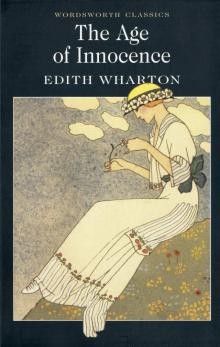 The Age of Innocence
The Age of Innocence The Reef
The Reef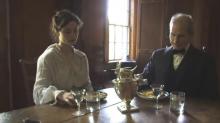 Summer
Summer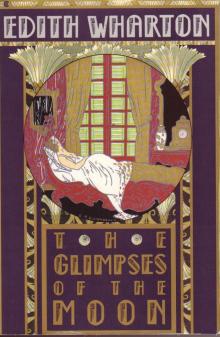 The Glimpses of the Moon
The Glimpses of the Moon Xingu
Xingu The Fruit of the Tree
The Fruit of the Tree Fast and Loose
Fast and Loose Artemis to Actaeon and Other Verse
Artemis to Actaeon and Other Verse The Line of Least Resistance
The Line of Least Resistance The Lamp of Psyche
The Lamp of Psyche The Reckoning
The Reckoning Afterward
Afterward The New York Stories of Edith Wharton
The New York Stories of Edith Wharton The 2014 Halloween Horrors Megapack
The 2014 Halloween Horrors Megapack 'Copy': A Dialogue
'Copy': A Dialogue The Recovery
The Recovery The Fulness of Life
The Fulness of Life Early Short Stories Vol. 1
Early Short Stories Vol. 1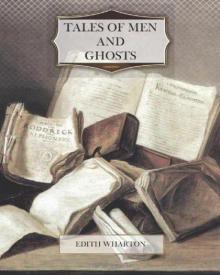 Tales of Men and Ghosts
Tales of Men and Ghosts The House of the Dead Hand
The House of the Dead Hand That Good May Come
That Good May Come The Buccaneers
The Buccaneers Other Times, Other Manners
Other Times, Other Manners The Hermit and the Wild Woman
The Hermit and the Wild Woman Kerfol
Kerfol The Duchess at Prayer
The Duchess at Prayer Bunner Sisters
Bunner Sisters The Choice
The Choice Madame De Treymes
Madame De Treymes Ethan Frome, Summer, Bunner Sisters
Ethan Frome, Summer, Bunner Sisters In Morocco
In Morocco The Valley of Decision
The Valley of Decision Age of Innocence (Barnes & Noble Classics Series)
Age of Innocence (Barnes & Noble Classics Series) The Angel at the Grave
The Angel at the Grave April Showers
April Showers Sanctuary
Sanctuary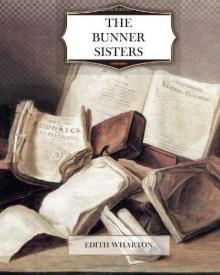 The Bunner Sisters
The Bunner Sisters Mrs. Manstey's View
Mrs. Manstey's View Writing a War Story
Writing a War Story The Custom of the Country
The Custom of the Country In Trust
In Trust The Triumph of the Night
The Triumph of the Night The Hermit and the Wild Woman, and Other Stories
The Hermit and the Wild Woman, and Other Stories Roman Fever and Other Stories
Roman Fever and Other Stories The Mission of Jane
The Mission of Jane The Descent of Man and Other Stories
The Descent of Man and Other Stories Coming Home
Coming Home The Touchstone
The Touchstone Early Short Stories Vol. 2
Early Short Stories Vol. 2 Edith Wharton's Verse, 1879-1919, from various journals.
Edith Wharton's Verse, 1879-1919, from various journals.